Imagine having a beautiful store stocked with amazing products, but only a handful of visitors ever stumble upon it. If you limit yourself to a single channel for your ecommerce business, this unfortunate scenario might be closer to reality than you think. While it may seem convenient to stick to what you know, the truth is that you're missing out on a vast potential market just waiting to discover your brand.
This is where the power of multichannel eCommerce comes into play. By strategically showing your products across multiple channels: popular online marketplaces, social media platforms, and niche websites, you open up a world of possibilities for your business. Suddenly, your products become visible to a diverse range of consumers actively seeking out new and exciting purchases.
So, are you ready to take your eCommerce business to new heights?

What is Multichannel eCommerce?
Multichannel eCommerce refers to the practice of selling products or services through multiple online channels simultaneously. This approach allows you to reach a broader audience and diversify your sales channels beyond a single platform or website.
Traditionally, eCommerce businesses would focus on a single channel, such as their own website or a popular online marketplace like Amazon or eBay. However, in today's digital landscape, consumers are active on various platforms, including social media networks, mobile apps, and specialized marketplaces. To effectively engage with these consumers and maximize sales potential, businesses now utilize multichannel strategies.
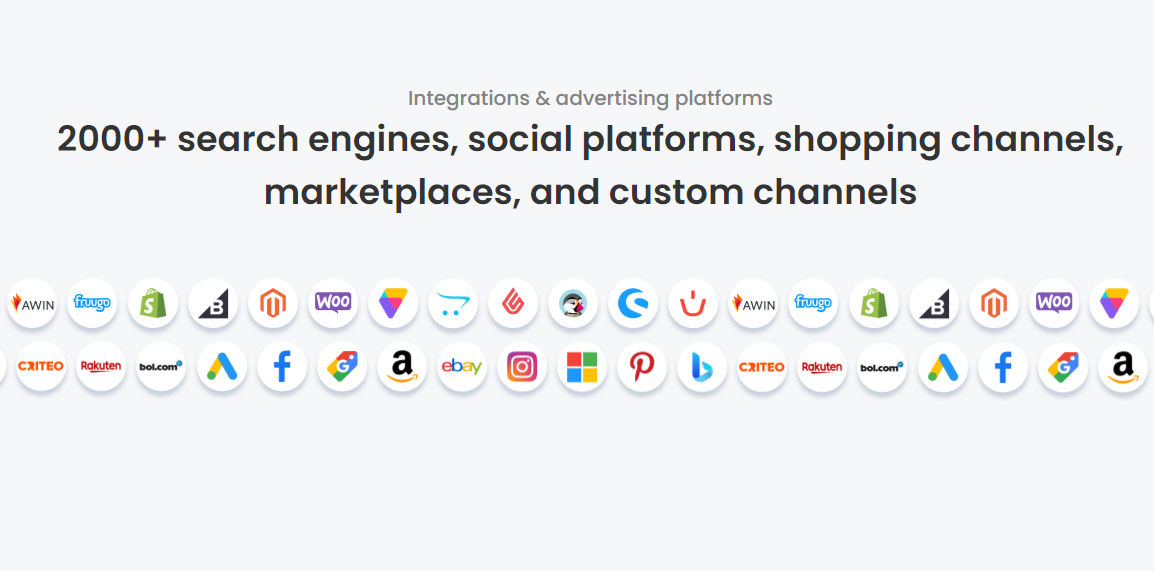
Available integrations | DataFeedWatch
By leveraging multiple channels, you can take advantage of each platform's unique features and target different types of audiences at the same time. For example, social media platforms offer opportunities for engagement and building brand loyalty, while Google and marketplaces provide access to a large customer base actively searching for products. With a multichannel approach, you can tap into these different channels to increase your reach, drive more traffic, and ultimately boost sales.
It's worth noting that managing multiple channels can be complex, requiring careful inventory management, pricing consistency, and streamlined order fulfillment. However, with the right tools, and strategies in place, you can effectively navigate the multichannel eCommerce landscape and leverage it to your advantage.
State on Multichannel advertising 2023
According to the Multichannel Marketing Report 2023, it's interesting to note that the average number of paid channels used by online retailers in 2023 dropped to 2.7 compared to 3.2 channels in 2022. This decrease happened because 30% of advertisers decided to spend less on ads this year.
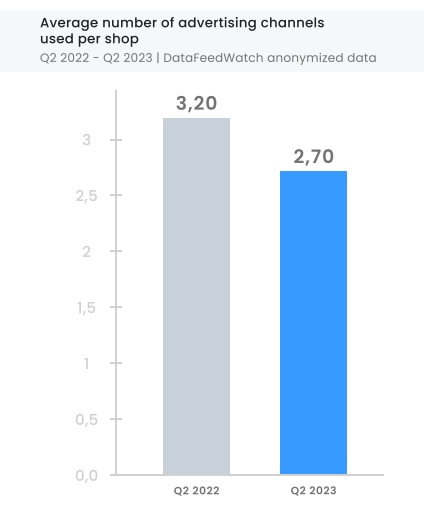
Source: Multichannel Marketing Report
However, this year's trend should not be taken as an approach worth following.
Even though there was a decrease in the use of paid channels between 2022 and 2023, things could change soon. A study by Insider Intelligence shows that 42% of advertisers plan to spend more on digital advertising in 2024, which could bring back growth in using a multiple channel strategy.
Also, advertising your products on channels where your competitors don't, gives you a huge advantage.
Multichannel listing explained
Multichannel listing is the practice of listing products and services across multiple digital platforms and channels.
Traditionally, multichannel listing involved physical catalogs and brick-and-mortar stores, which required substantial resources and limited geographic coverage. However, with the rise of ecommerce, you now have the opportunity to showcase your products on a diverse range of digital channels.
In the modern landscape, multichannel listing has evolved to include various online platforms such as search engines, marketplaces, social media networks, mobile apps, and specialized niche websites. By leveraging these digital channels, you can significantly expand your reach and tap into new audiences in diverse locations and demographics.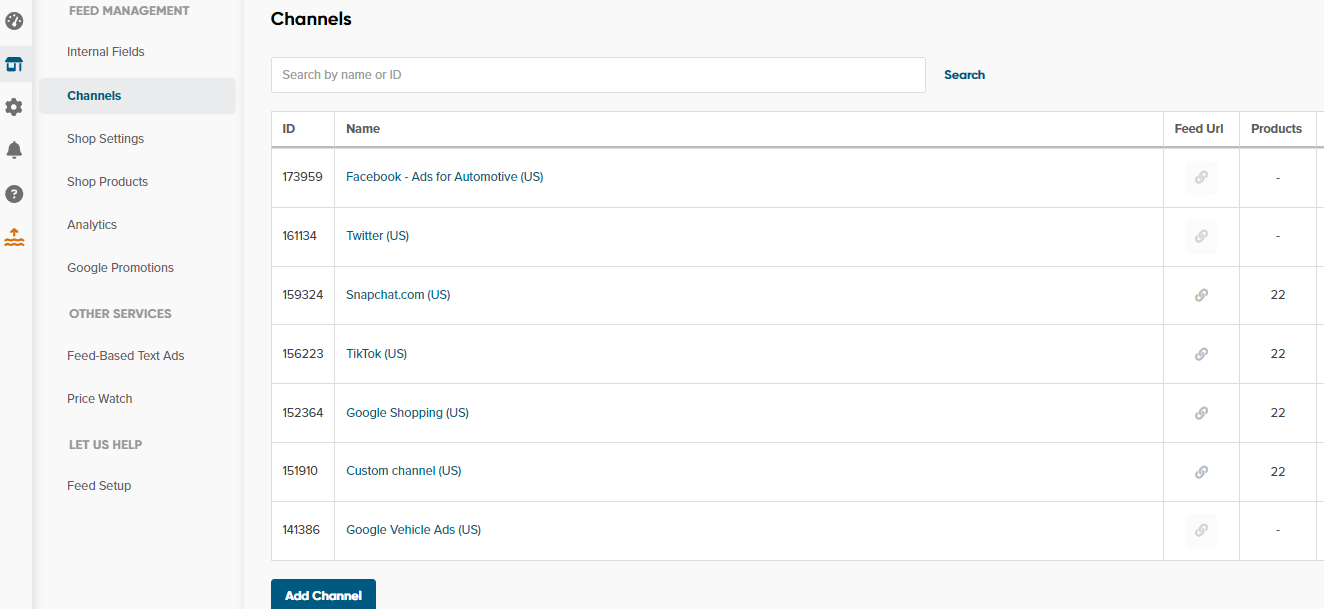
Multiple channels | DataFeedWatch
8 benefits of multichannel eCommerce strategy
The benefits of multichannel listing extend far beyond simply exposing your products to a broader audience. When you list your products on multiple channels, it can significantly increase your sales. Businesses that expand their selling across various channels tend to earn more revenue compared to those who limit themselves to a single platform. Multichannel listing can benefit your business in many ways.
1. Increased reach
Multichannel allows businesses to expand their market reach by listing products on multiple platforms and channels, ensuring visibility to a wider audience.
2. Diversified customer base
By leveraging different channels, businesses can attract diverse customer segments, reaching individuals who prefer specific platforms or marketplaces.
3. Enhanced brand exposure
Listing products on various channels increases brand visibility and exposure, helping to build brand recognition and attract new customers.
4. Enhanced brand's credibility and trustworthiness
Customers tend to place more confidence in businesses that have a strong presence in multiple places, as it signals a certain level of professionalism and reliability.
5. Customer insights
Multichannel strategies provide access to valuable customer data and insights, allowing businesses to understand customer behavior and preferences across different platforms.
6. Enhanced customer experience
Offering multiple channels enables businesses to provide a seamless shopping experience, meeting customers where they are already active and making it convenient to purchase.
7. Competitive advantage
Utilizing a multichannel approach helps businesses stay competitive in the ecommerce landscape by reaching customers through various touchpoints.
8. Flexibility and adaptability
With a multichannel strategy, businesses can quickly adapt to changing market trends and consumer behaviors, exploring new channels as they emerge.
Multichannel listing setup
To set up multichannel listings, you can utilize the services of an ecommerce platform provider like Shopify, WooCommerce or Magento. These providers seamlessly integrate with various marketplaces and digital channels, enabling you to effortlessly list your products across multiple platforms simultaneously.
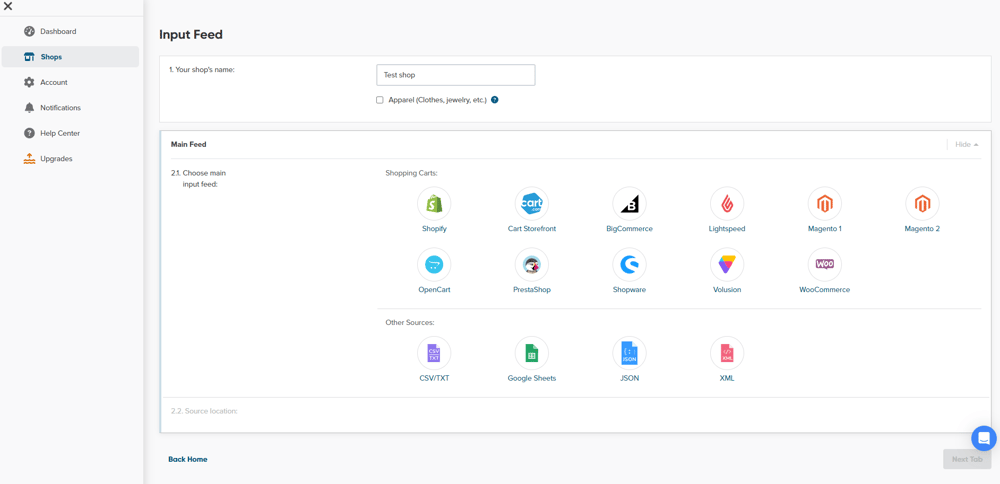
Integrating your online store with a feed management tool | DataFeedWatch
When using these platforms, it's common for them to charge a small commission from the final sale as compensation for hosting the transaction. This arrangement ensures a fair and mutually beneficial partnership between businesses and the platforms facilitating their multichannel presence.
What’s important to note is that eCommerce platform’s fields don’t always match the chosen channel’s fields. DataFeedWatch is a reliable multichannel eCommerce platform that can assist in efficiently matching & mapping fields, listing, optimizing, and managing your multichannel product listings.
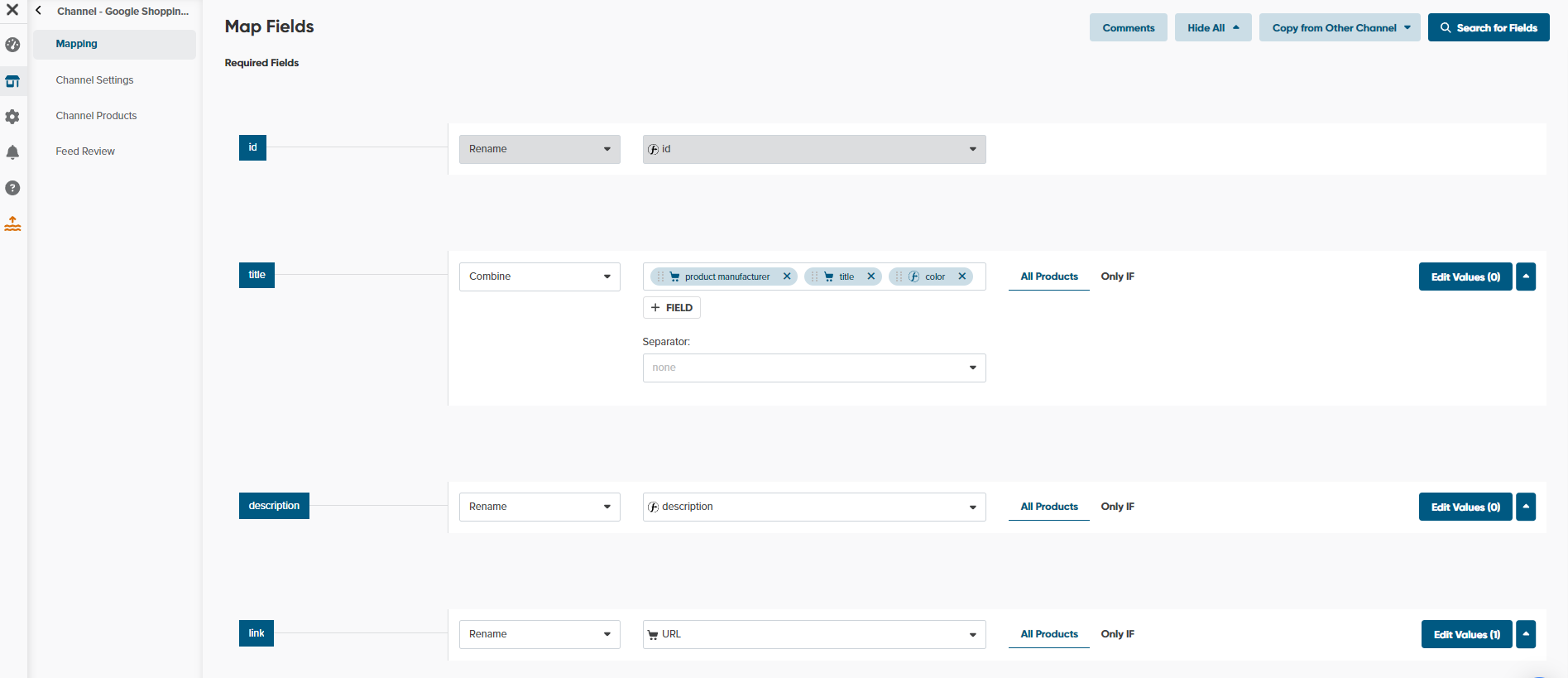
Mapping your feed | DataFeedWatch
What is multichannel eCommerce management?
With the evolution of technology and changes in consumer buying habits, eCommerce has naturally adopted a multichannel approach. It is now available both online and in physical retail stores.
The concept of multichannel eCommerce management refers to the practice of implementing a marketing strategy that utilizes multiple distribution channels simultaneously. The goal is to expand the company's reach by maximizing points of contact across various platforms, such as online sales platforms, marketplaces, mobile applications, physical retail stores, traditional advertising campaigns, and third-party distributors.
However, for a multichannel strategy to be effective, it requires consistent management across all channels to avoid self-competition. It is important to prevent one channel from overshadowing others, as the success of one channel shouldn't come at the expense of others.
Effective multichannel e-commerce management requires coherent management across all channels to ensure consistency in branding, messaging, pricing, inventory, and customer experience. Additionally it aims to achieve the following:
- Providing customers with a seamless and unified shopping experience across various platforms.
- Improved evaluation of sales challenges.
- Greater consistency in channel usage aligned with business goals, targets, and internal rules.
- A unified and seamless approach to customer relations within a diverse ecosystem of multiple channels.
- Optimized sales and revenue by leveraging the strengths of different channels.
How to manage your multichannel eCommerce?
When it comes to managing multichannel e-commerce, using a feed management solution can be beneficial. This is a platform that allows businesses to streamline and optimize their product feeds across multiple channels. It enhances data accuracy and makes sure the ads are up-to-date.
Challenges in managing multiple channels
Managing multiple channels in eCommerce presents a set of unique challenges. Some common challenges include:
Channel Complexity
Each channel has its own set of requirements, guidelines, and formats for product listing, which can be time-consuming and complicated to manage.
Inventory Management
Keeping track of inventory across multiple channels can be challenging, especially when stock levels change rapidly. The risk of overselling or underselling increases without proper synchronization.
Information Consistency
Ensuring consistent branding, product information, pricing, and messaging across different channels can be difficult, potentially leading to confusion and customer dissatisfaction.
Data Integration
Integrating data from various channels into a centralized system can be a technical challenge. It requires careful synchronization of product information, inventory levels, and order details to maintain accuracy and avoid discrepancies.

Ideal multichannel eCommerce management tool
Choosing the tool to manage your multichannel listings is very important. It cannot be just any tool. It must have all the features that allow you to perform the following actions:
You can easily create and optimize product data
The tool allows you to create and optimize your product feeds by implementing rules and mappings to ensure accurate and high-quality data across all channels you use. You can use a user-friendly interface to make all changes.
You manage multiple channels using one tool
Your feed management system provides a centralized platform for managing product feeds, enabling you to organize and optimize your feeds for various channels in one place.
You have a possibility to seamlessly integrate with many channels
DataFeedWatch simplifies the process of integrating with multiple eCommerce channels, including online marketplaces and advertising platforms. It eliminates the need for manual data entry and ensures consistent and up-to-date information across all channels.
You can copy optimizations from one feed to another
With an ideal multichannel eCommerce management tool, you can easily copy your feed optimizations to multiple shopping channels with just a single click. This saves time and effort in implementing changes across different platforms.
You can track performance on different channels in the very same tool
The platform provides insights and analytics to track the performance of product feeds on different channels. This data can be used to make informed decisions and optimize strategies for improved results.
Wanna know more? Read our article: How To Choose The Best Feed Management Tool?
How DataFeedWatch can help with multichannel management
DataFeedWatch is a powerful multichannel management platform that can greatly assist you in optimizing your eCommerce operations. Through its comprehensive suite of tools and features, DataFeedWatch enables you to streamline the creation, management and optimization of your data feeds for multiple shopping channels.
The platform offers a unified interface for managing shopping feeds, providing you with a centralized hub to oversee and control your multi channel integration. This ensures consistency and accuracy across all channels. Moreover, it allows you to schedule multiple daily updates to keep your product data up-to-date at all times.
You can easily copy data feed optimizations across various channels. This saves time and effort by eliminating the need to manually recreate rules and mappings for each platform.
DataFeedWatch has been trusted by businesses worldwide, making it one of the most selected data feed tools in the world. With a free trial and live demo available, you can experience the benefits firsthand before committing to the platform.
Conclusion
Today, mastering multichannel eCommerce listing and management is no longer an option but a necessity. By expanding product exposure across multiple channels, businesses can reach a wider audience, increase sales, and stay competitive.
Multichannel management platforms provide invaluable tools and features that simplify the complex process of managing inventory, orders, and customer support across various channels. By centralizing operations, businesses can save time, reduce errors, and deliver a seamless experience.
Any thoughts or questions? Please share in the comments section below.
Read also: Top eCommerce Channels for Retailers [5 Industries Overview]

